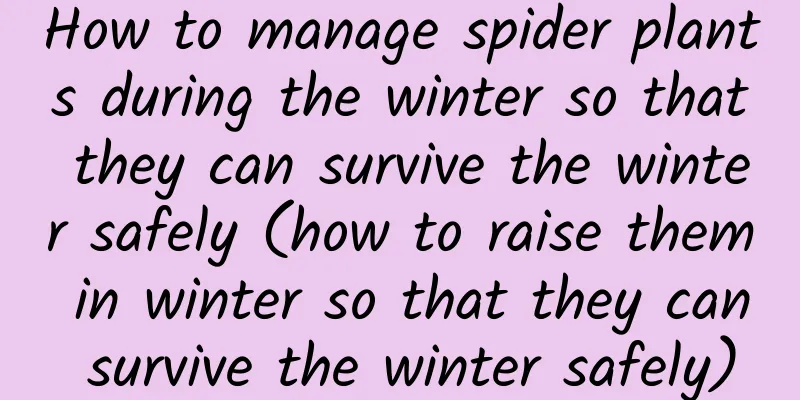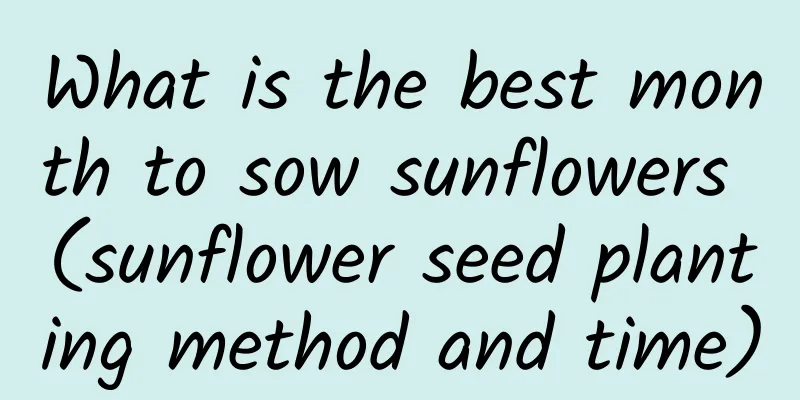How to manage spider plants during the winter so that they can survive the winter safely (how to raise them in winter so that they can survive the winter safely)

What measures can be taken to ensure that Chlorophytum safely survives the winter?As the year comes to an end, the temperature drops to the lowest level of the year. Herbs that are not resistant to severe cold, such as spider plants, aloe vera, and green ivy, may suffer from frostbite, yellow leaves, and water if we are not careful. What specific measures can be taken to ensure their safe wintering? ⑴Increase the ambient temperature:Herbs that are not cold-resistant have reached their tolerance limit when facing an ambient temperature of around 5°C. If the local minimum ambient temperature is close to this range, it is necessary to move the flowers and plants that are not resistant to severe cold to relatively warm indoor areas, corridors, and enclosed balconies to spend the winter. Flower lovers who grow a large number of flowers and plants can also build small greenhouses in advance. ⑵Watering should be done in moderation:In winter, the growth and metabolism of potted plants are slow, and the water in the pots is not easy to evaporate. Watering should be done in moderation to avoid water accumulation in the pots and keep the soil dry, which will also help improve the cold resistance of potted plants. To grow flowers in winter, you only need to water them in small amounts in sunny afternoons when the ambient temperature is relatively high to maintain basic moisture for survival. ⑶Maintain proper lighting:Although ultraviolet rays are relatively weak in winter, there is still sunlight. After potted plants are brought indoors, they should still be placed in a brightly lit environment. Even if they are exposed to sunlight through glass, it is better than not seeing sunlight all day. Adequate light is beneficial for potted plants to fully carry out photosynthesis and accumulate nutrients. It also has a certain improvement effect on preventing potted plants from growing too tall, growing weak, and having soft leaves. Flower lovers who have the conditions can also consider using fill lights for a short period of time to concentrate on caring for flowers and plants that are not cold-resistant for a period of time. Finally, flower lovers who live in areas with heating in winter and who use heating equipment indoors need to be careful not to place foliage plants directly facing heat radiation sources such as radiators, air-conditioning vents, and electric heaters, so as to avoid damaging the delicate leaves. When the indoor environment is particularly dry, you can place a tray with a small amount of water at the bottom of the flowerpot or spray water around the flowerpot to increase the humidity of the environment to prevent foliage plants from having dry tips and losing their green leaves due to being in a dry environment for a long time. If you do these, potted spider plants will have no problem surviving the winter! |
Recommend
How to quickly grow a Jade Plant into an old pile (how to quickly take root and grow it into a bonsai shape)
How to cultivate Jade Plant to quickly grow into ...
How to care for colorful roses
Colorful rose growth conditions The colorful rose...
How to cultivate colorful trachycarpus
1. Lighting When cultivating the Ichthyophthirius...
When to prune orange trees
1. Time for pruning The best time to prune orange...
Can passion fruit seeds be planted?
Can passion fruit seeds be planted? Passion fruit...
How to water gardenia in summer
Principles of watering gardenia in summer The fre...
How to grow potted chrysanthemums and precautions
Chrysanthemum growth habits Potted chrysanthemums...
How often should I water the Jade Dew? Watering methods and precautions
How often should I water the jade plant? Jade pla...
Milan pruning time and method
1. Pruning time It is recommended to prune Milan ...
Why are the leaves of hydrangea turning yellow?
1. Improper watering Reason: Watering is a very i...
What is the effect of Cistanche deserticola? Can it enhance sexual function?
1. What is the function Cistanche has many functi...
How to care for jasmine correctly
Jasmine is a traditional famous flower in China. ...
How to keep baby's breath
Habits Gypsophila prefers a warm, humid and sunny...
Meat rabbit breeding skills and methods
Meat rabbit, also known as vegetable rabbit, is a...
Can fuchsia be placed indoors?
1. Can it be placed indoors? It can be placed in ...









